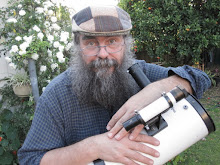Sunday, November 27, 2005
IDiocy in our papers
Intelligent design, the idea that if we can't describe the evolution of a given biological system on a mutation by mutation basis, then something, somewhere, somehow designed that biological system via unknown processes, has hit Australian newspapers again. First we have the Campus crusade for Christ spending upwards of $65,000 to distribute 3000 slick ID creationism DVD's to schools (but they are not trying to promote teaching ID in schools, oh no). Then we had the Age publishing an opinion piece by Peter Coghlan that more or less uncritically accepts Behe's statement that bacterial flagella can't evolve and suggests that ID could be raised in high school biology classes. As I have written a book chapter describing how bacterial flagella may have evolved (and collaborating on a major review of the subject), I fired off a letter to the Age. It didn't get published, nor did any of the other letters I knew that were sent get published. In the end only one rather anodyne letter that did not address major issues of fact was published. Here is the letter I sent.
I didn't expect my letter to get in. Back in August the Religious editor of the Age published an opinion piece lambasting scientists for "scientific fundamentalism". It also claimed ID was scientific and not religiously motivated. There were numerous errors of fact in that article, and I and others fired off letters pointing this out. None got published. I had an amiable correspondence with the Religion Editor, sent him my chapter, and he promised to pass on my letter pointing out the errors of fact to the letters editor. I sent it off to him ... and nothing happened. For the record, here is the letter about the August article.
That letter only covered the most significant errors of fact. But no correction to even these errors was ever published. Now there are readers of the Age who seriously think that Behe is a non-Christian. The general public, listening to our media, will be under the impression that ID is science, and that it is being kept out by a conspiracy of scientific fundamentalists.
"A lie can circle the world while Truth is putting its boots on" writes Terry Prachette in ÂThe TruthÂ. This adage has never been more true than in the recent Australian encounters with Intelligent Design Creationism. This is how pseudoscience wins, but taking the issue to the media. The ID proponents can say all the nonsense they like, and real scientists can't get a word in because editors have other priorities that ensuring that nonsense gets corrected. Ordinary scientists are shut out by editors who think they have published enough articles on the subject.
In Terry Prachettes fantasy, a man with a printing press prints the truth against all odds, sadly, in Australia, getting the truth out remains a fantasy.
Dear Sir/Madam
Peter Coghlan's essay (God v science? Age 23//11/05) interested me, as I have written a book chapter on what Dr. Behe says can't occur, the evolution of bacterial flagella.
We should be wary of Dr. Behe's claims. At the recent Dover trial Behe revealed that he hasn't read the substantial literature on the biology of the systems he says is "irreducibly complex"(IC).
Evolutionary biologists predicted that fish would lack part of the
blood clotting system that Dr. Behe claims is IC. That prediction was confirmed, yet Dr. Behe still tells his audiences that the clotting system is IC. Behe claims that the component parts of the bacterial flagellum have no function outside the flagellum, yet these components do function outside the flagella as pumps, adhesion systems and to allow bacteria glide over surfaces. We also have evidence that part of the flagellum was originally part of a
secretory system. Dr. Behe ignores this.
IC depends on our ignorance of structures, not on our understanding of them. These examples show one reason why Intelligent Design is not science. While individual claims about flagella and clotting systems have been refuted, these refutations are ignored by ID proponents who continue as before.
Dr. Coghlan suggests this debate could be raised in senior high schools. But students barely have enough time to learn the core principles of biology. If we waste their time with a debate arising simply because ID proponents haven't read the relevant scientific literature, we do the students a grave disservice.
Ian Musgrave has authored a chapter on the evolution of the bacterial flagella in "Why Intelligent Design Fails" Rutgers University Press, 2005
I didn't expect my letter to get in. Back in August the Religious editor of the Age published an opinion piece lambasting scientists for "scientific fundamentalism". It also claimed ID was scientific and not religiously motivated. There were numerous errors of fact in that article, and I and others fired off letters pointing this out. None got published. I had an amiable correspondence with the Religion Editor, sent him my chapter, and he promised to pass on my letter pointing out the errors of fact to the letters editor. I sent it off to him ... and nothing happened. For the record, here is the letter about the August article.
In the Age Opinion page of 18 August, Religion Editor Barney Zwartz asks for a proper scientific debate on Intelligent Design Creationism. Scientists will welcome that, when the Intelligent Design Creationists produce some science, instead of recycling failed arguments and producing fancy DVD's. Almost every item of alleged fact in Mr. Zwartz's article is wrong. Intelligent Design was a carefully crafted response of the creationist movement after a series of court defeats prevented its teaching in US schools. Michael Behe is a Catholic, not a non-Christian, and he first presented his ideas in a creationist textbook. Most of the key players in the ID creationist movement are not scientists, but lawyers or philosophers. Furthermore, they are all conservative Christians who have openly spoken of their theological agendas. Rick Sternberg was not hounded out of his job as editor; he had already come to the end of his term as editor and retired. These are all matters of fact, and can be readily checked. The concern about ID creationism is because its proponents want it taught as science. The scientific opposition is due to real concern over the subversion of the process of science to teach something that has no evidential support.
Yours sincerely
Ian Musgrave; chapter contributor, '"Why Intelligent Design Fails", Rutgers University Press.
That letter only covered the most significant errors of fact. But no correction to even these errors was ever published. Now there are readers of the Age who seriously think that Behe is a non-Christian. The general public, listening to our media, will be under the impression that ID is science, and that it is being kept out by a conspiracy of scientific fundamentalists.
"A lie can circle the world while Truth is putting its boots on" writes Terry Prachette in ÂThe TruthÂ. This adage has never been more true than in the recent Australian encounters with Intelligent Design Creationism. This is how pseudoscience wins, but taking the issue to the media. The ID proponents can say all the nonsense they like, and real scientists can't get a word in because editors have other priorities that ensuring that nonsense gets corrected. Ordinary scientists are shut out by editors who think they have published enough articles on the subject.
In Terry Prachettes fantasy, a man with a printing press prints the truth against all odds, sadly, in Australia, getting the truth out remains a fantasy.
Comments:
<< Home
It is a shame that your letters didn't get published Ian. At least Dr Karl sometimes talks about ID being non-science on his radio show.
A few weeks ago I had a 'debate' about ID with a relative. They told me that there are different definitions of science and my claim that "if it's science it follows the scientific method" was an advanced academic version of science that wasn't appropriate for schools. They also tried the "you shouldn't be close-minded and exclude other views" angle. I pointed out that science develops by trial and error and actively tries new ideas all the time.
A few weeks ago I had a 'debate' about ID with a relative. They told me that there are different definitions of science and my claim that "if it's science it follows the scientific method" was an advanced academic version of science that wasn't appropriate for schools. They also tried the "you shouldn't be close-minded and exclude other views" angle. I pointed out that science develops by trial and error and actively tries new ideas all the time.
Ah, relatives. "advanced academic version" .. How long did you take to pick your jaw up off the ground. While philosophers such as my friend John can spend lifetimes arguing about the nuances of what science is, following the scientific method is a pretty good rule of thumb. Yes, science tries new ideas all the time, some of our most pwoerful current ideas were wild and wacky at one stage. The difference between continental drift, jumping genes and "intelligent design" is that those folks produced testable hypotheses, then did the hard yards, and accumulated evidence, published in real scientific journals. The ID folks wave their hands and give talks in church halls.
Of course we should be open minded (but never so open minded as to let our brains fall out), but evidence is the touchstone in science. When Stanley Prussiner came up with the idea of prions, proteins that self-replicate without needing DNA or RNA, the sicentific world was incredulous, the idea broke all dogma in biology. Yet 10 years later over 1,000 refered original research journal articles had been published on these "heretical" prions, and prions were a major research field. After 10 years of "intelligent design", we have one "refereed" reveiw paper that sort-of mentions ID (and even that got snuck in by a sympathetic editor), one paper with no original research, that's it. That simple statistic shows how irrelevant ID is to science.
Post a Comment
Of course we should be open minded (but never so open minded as to let our brains fall out), but evidence is the touchstone in science. When Stanley Prussiner came up with the idea of prions, proteins that self-replicate without needing DNA or RNA, the sicentific world was incredulous, the idea broke all dogma in biology. Yet 10 years later over 1,000 refered original research journal articles had been published on these "heretical" prions, and prions were a major research field. After 10 years of "intelligent design", we have one "refereed" reveiw paper that sort-of mentions ID (and even that got snuck in by a sympathetic editor), one paper with no original research, that's it. That simple statistic shows how irrelevant ID is to science.
<< Home





 Click to read about or order
Click to read about or order Click to read about or order
Click to read about or order Click to read about or order
Click to read about or order Click to read about or order
Click to read about or order




